本帖最后由 张涛老师 于 2025-10-31 19:21 编辑
P5-P6 | End of Year Holiday & Semester 1 Curriculum
Two of the most challenging primary school mathematics competitions - RMO and APMOPS - will take place next April. Compared to NMOS, these contests cover a broader scope with greater complexity and higher difficulty levels. To achieve outstanding results, students must utilize this holiday period and the remaining six months to: Fill up gaps in knowledge points, conduct systematic revision, as well as start practice on integrated questions with multiple modules tested. This comprehensive preparation is essential for boosting competitiveness in these prestigious competitions.
Why Parents Choose Kangaroo Study?
1. Achievement Highlights
Since joining Kangaroo Study, our P4 to P6 students have consistently achieved outstanding results in various primary school mathematics Olympiads across Singapore. Many students have actively participated in competitions such as NMOS, APMOPS, and RMO, performing exceptionally well. Between 2023 and 2024, they earned numerous Gold and Platinum awards, with many advancing to the finals and one even claiming the top spot nationwide.
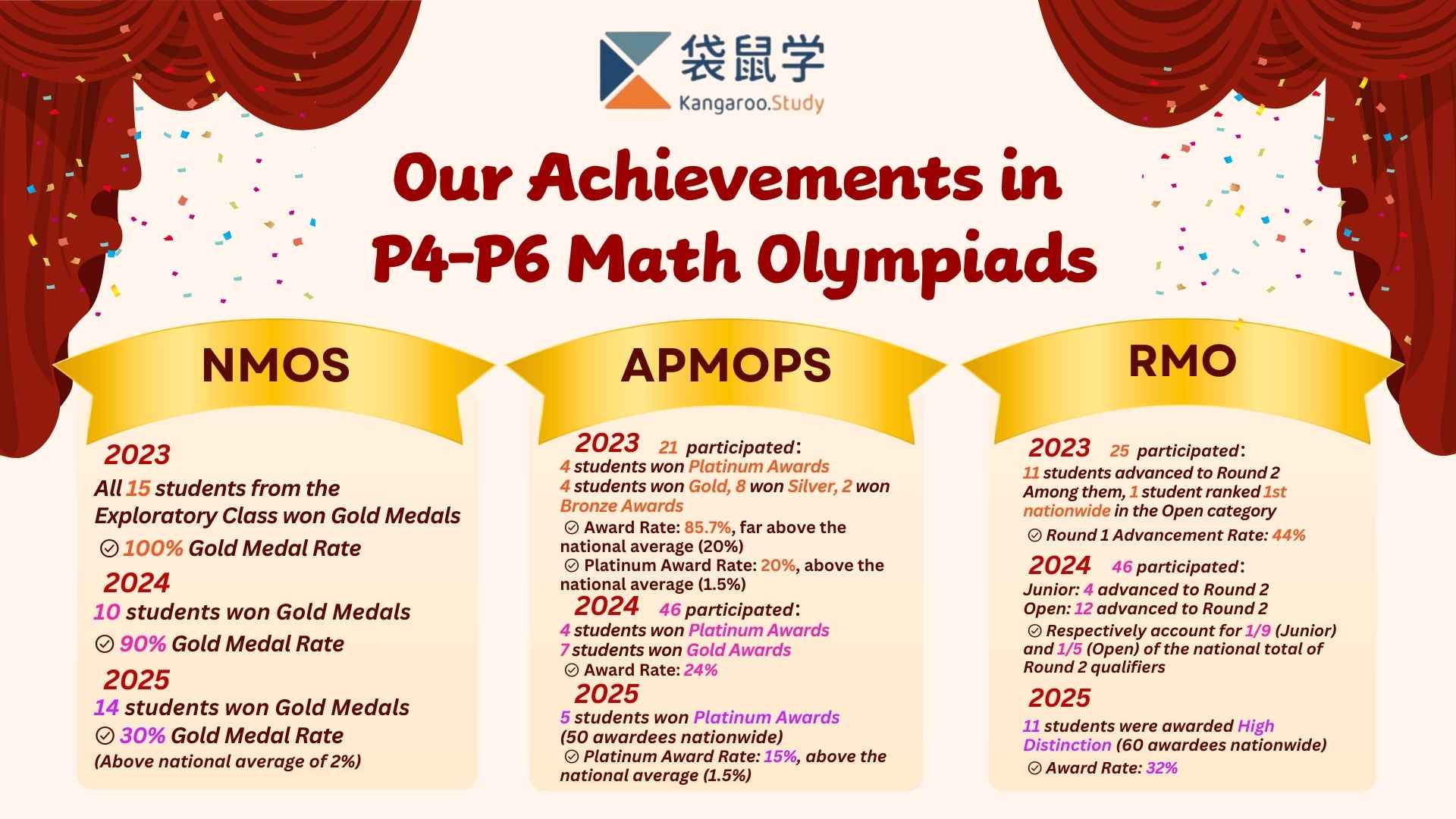
2. Feedback from Parents
Here are some genuine feedback from parents about our P5 teachers. Their engaging classes have earned widespread praise, with many parents sharing that their children enjoy learning here, have developed a strong interest in mathematics, and have shown significant improvement in their performance. Every word of encouragement serves as our motivation to continually refine and enhance our courses.
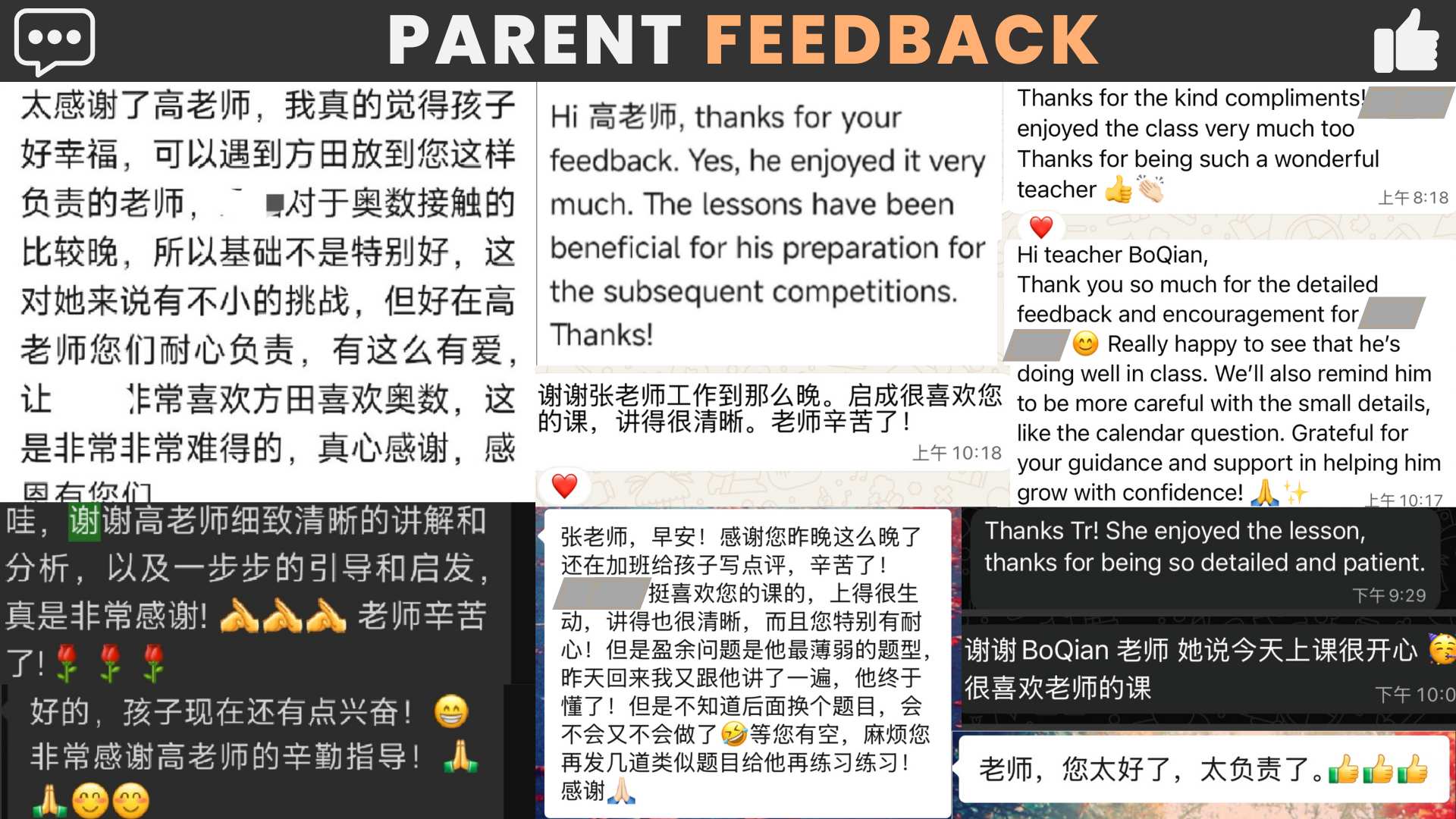
Challenges in RMO and APMOPS and Important Preparation Content
1. Broader knowledge points
RMO and APMOPS both require a significantly broader and deeper knowledge base compared to NMOS, covering all primary school Olympiad math topics plus additional advanced concepts and specialized problem types. For instance, in geometry, students must master everything from basic circle and sector area calculations to complex skills like solving problems involving composite shape manipulation, rolling movements, rotational geometry, and path tracing. To succeed, students need to be able to master the content, and also having the ability to flexibly apply knowledge points learnt, and specialized techniques for unconventional problems. This expanded knowledge framework is essential for tackling the competitions' diverse and challenging questions that go well beyond standard NMOS requirements.
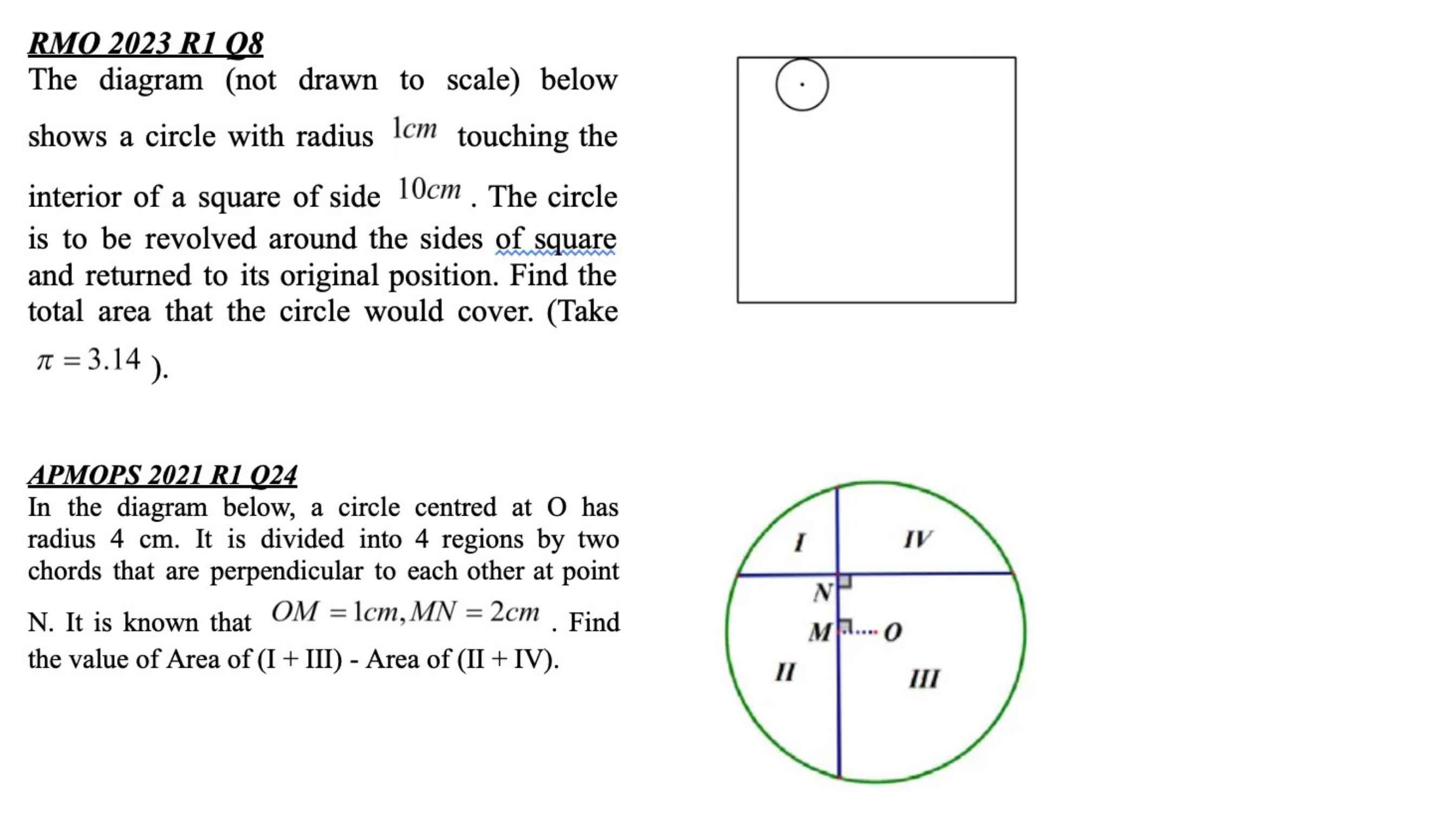
2. Increased Difficulty
Both RMO and APMOPS cover all the topics tested in NMOS, but with significantly increased difficulty and complexity for the same concepts. Here are two examples to illustrate this difference:
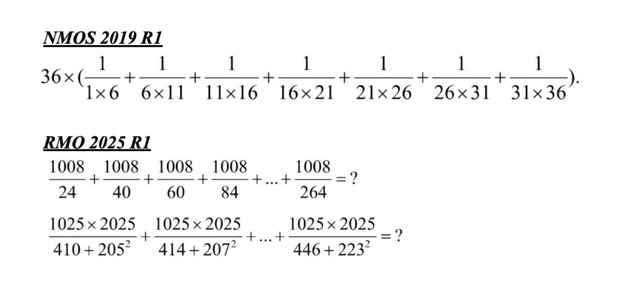
The same topic of fraction decomposition appears in both NMOS and RMO, but in RMO: Students must first construct or manipulate numbers/expressions to reveal the pattern, they are required to find creative ways to reform numbers and formula application. This demonstrates how RMO takes fundamental concepts and elevates them through layers of mathematical reasoning and creative problem-solving.
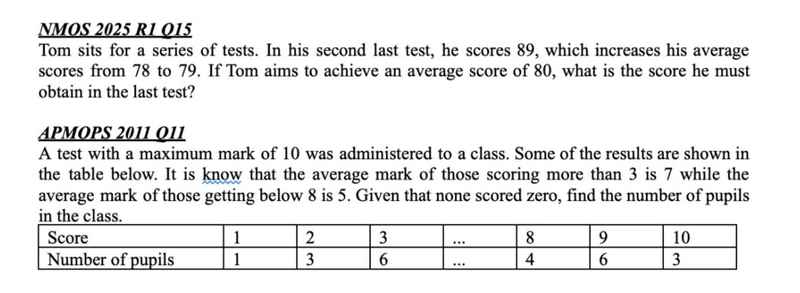
These two problems test the "transfer and balance" concept learned in Primary 2/3 about averages. While NMOS problems can be solved with a single diagram and step, APMOPS questions feature multiple average values requiring dual-layer transfer-balance analysis - a challenge only a handful of students can solve independently.
This demonstrates that students cannot simply rely on prior knowledge. They must master new advanced concepts, deepen understanding of previously learned material and improvise on their proficiency to RMO/APMOPS standards.
Only through this comprehensive approach can students properly prepare for these demanding competitions. The key lies in transforming basic conceptual understanding into sophisticated problem-solving ability capable of handling multi-layered mathematical challenges.
3. Complex integrated questions
RMO and APMOPS problems are more complex than NMOS. While NMOS usually tests one concept per question, RMO and APMOPS often combine multiple concepts into a single challenging problem. So, students need to not only master each concept but also learn to analyze complex problems and flexibly integrate multiple concepts to solve problems based on the question's characteristics.
Kangaroo Study's P5 Course Features
After completing the final new concepts in 2025 Semester 2, the remaining curriculum will conduct comprehensive module-by-module reviews with these features:
1. Topic by topic revision
The review starting from the year-end holiday will follow the 7 major modules of the Olympiad system: calculation, counting, number theory, word problems, mixed problems, and travel problems. Each module will be reviewed by systematically covering all knowledge points involved in RMO and APMOPS. Our learning scope will fully encompass the content assessed in RMO and APMOPS. All past exam questions from RMO and APMOPS can be matched with what we'll be studying.
2. Reinforcement with past year questions
For each module, we will select several classic exam questions from previous years that correspond to the topic. Studying with actual exam problems helps students better understand question patterns and familiarize themselves with RMO and APMOPS' problem-setting styles. Additionally, Kangaroo.Study's teachers will also create new extension questions based on past exam problems. Going beyond just past papers ensures more comprehensive mastery of concepts, preparing students for these competitions' flexible and varied question styles.
3. Active learning
The challenging problems in RMO and APMOPS primarily test students' grasp of mathematical thinking methods. Common approaches include: reverse thinking for difficult problems, extreme case analysis, and starting from simple cases. These thinking methods aren't tested as standalone question types, but rather integrated with various knowledge modules. Therefore, our teaching materials specifically select such problems. During instruction, we analyze the characteristics of these questions and the principles behind their solving methods. We've also designed dedicated lesson units - like optimization problems - to systematically develop these thinking skills. This two-pronged approach, covering both knowledge and thinking methodology, thoroughly prepares students for RMO and APMOPS.
Course Outline
To ensure that children can make the most of their holiday time, our courses are scheduled in three separate sessions. Each session covers the same content, so students only need to enroll in one session without attending multiple times.
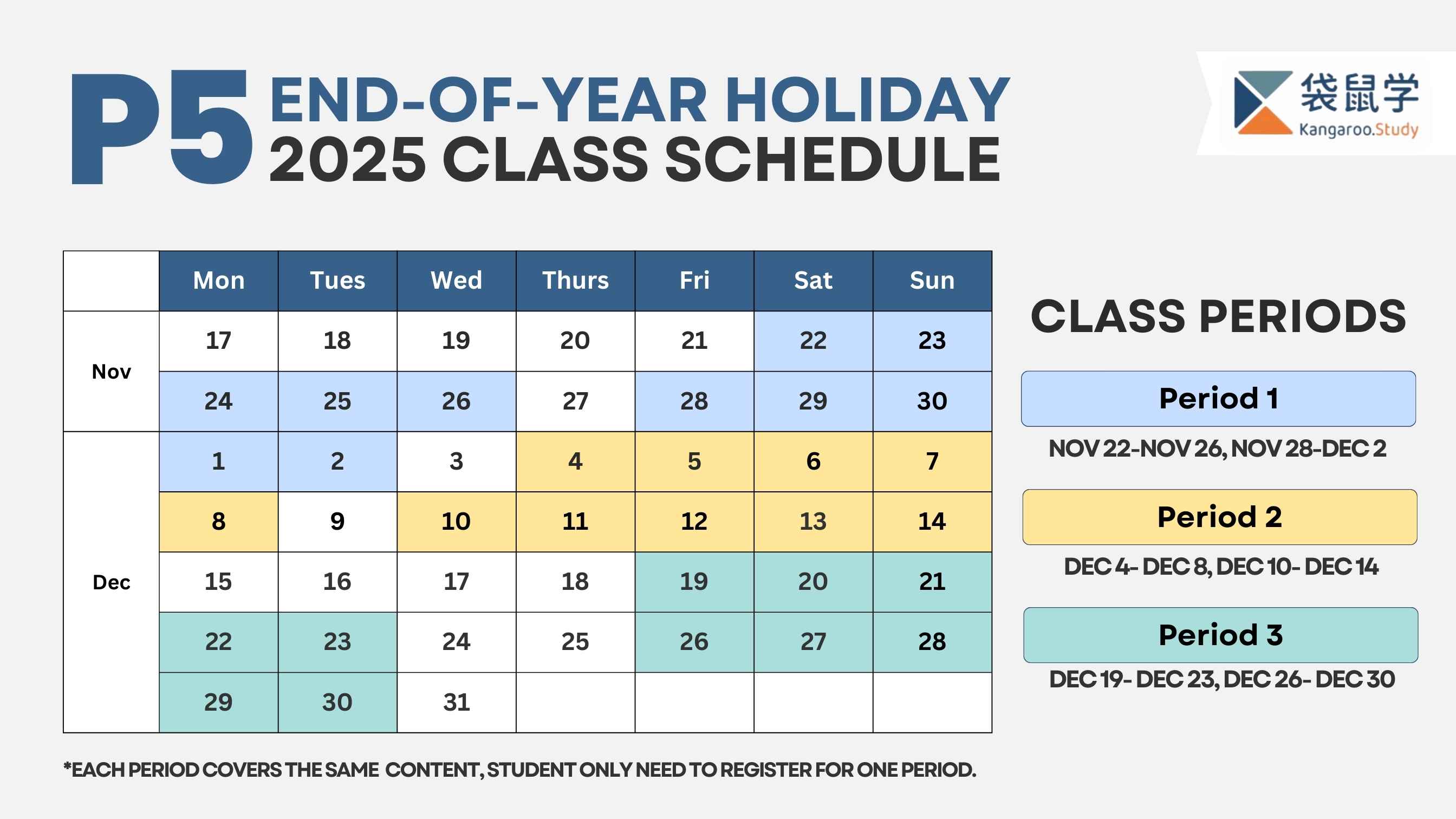
After analyzing high-frequency topics from RMO and APMOPS over the past decade and aligning them with current learning objectives, we have planned the following study content for our end of year holiday courses, as well as the first semester at the beginning of next year:
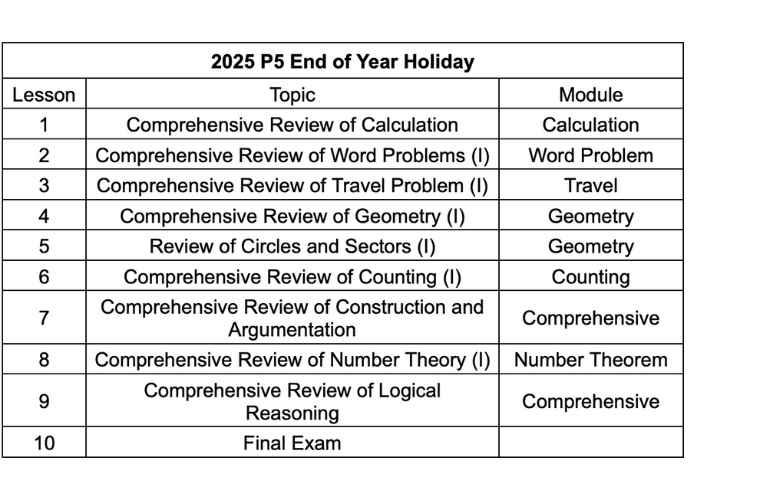
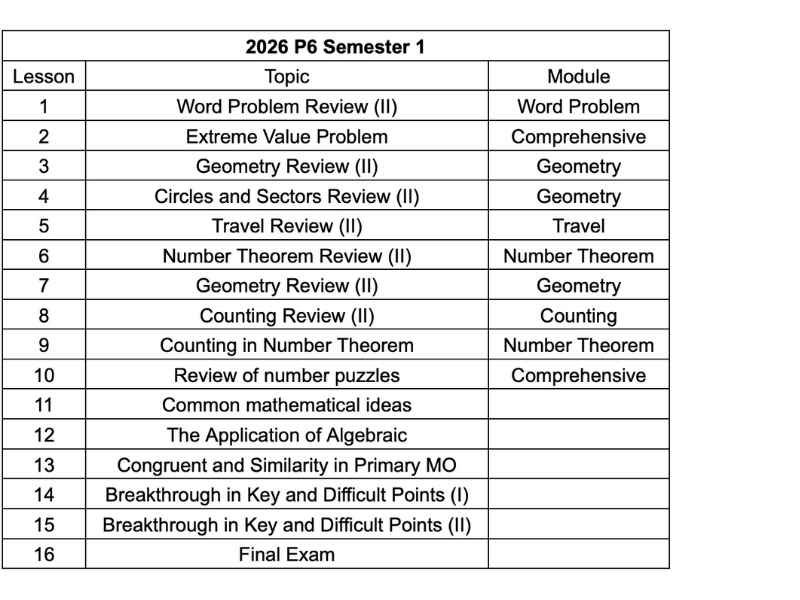
Each term offers flexible scheduling to meet different students' needs. The current course schedule is specially arranged for Kangaroo Study's existing students, who will enjoy priority registration until 11:59PM on August 24 (Sunday). After this date, registration will be open to all students.
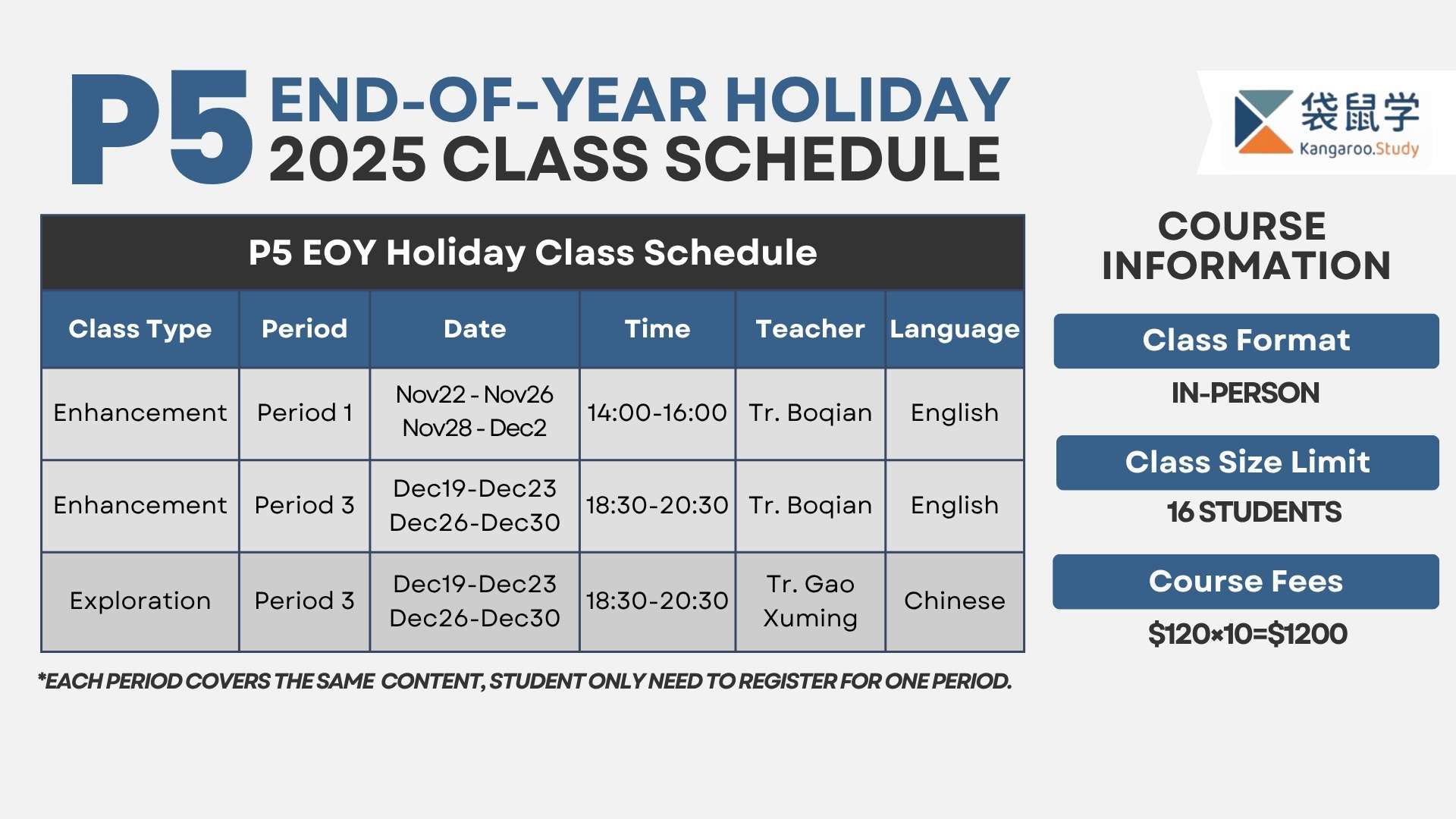
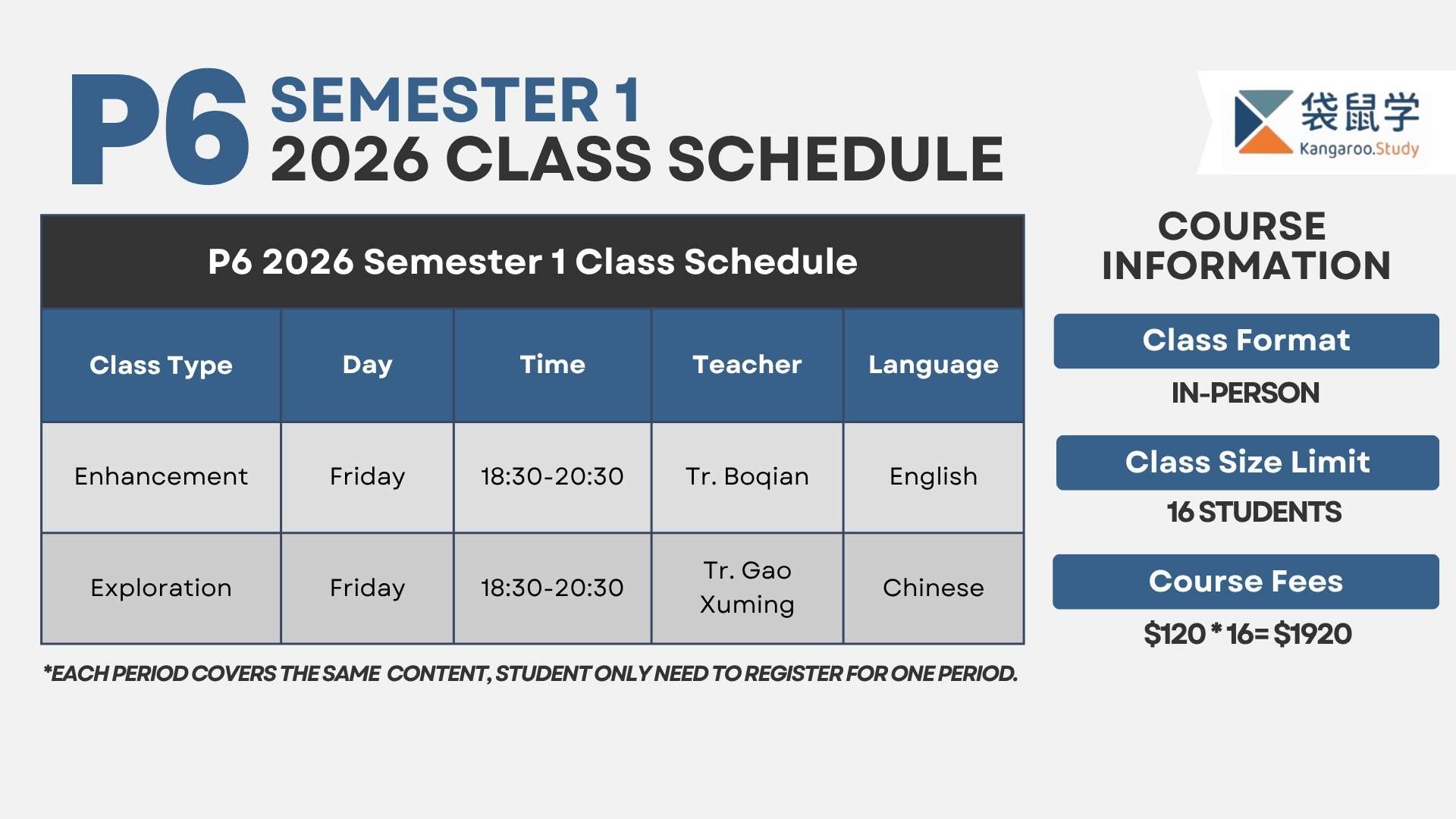
We encourage our current students to register early to secure their spot in class.
Meet Our Teachers

Tr. Boqian
Originally from Jilin, China, Teacher BoQian achieved 1st place with the highest score in his high school entrance examination at age 16, earning a full scholarship to Raffles Institution, Singapore’s premier junior college. He later graduated from the National University of Singapore (NUS). Having lived in Singapore for 15 years, he has a deep understanding of the local education system, academic pathways, and student needs.
Teacher Bo Qian has garnered accolades in numerous national and international competitions,including: - Gold Medal – Hua Luogeng Gold Cup Mathematics Competition
- Perfect Score – American Mathematics Competition (AMC 8)
- Top 1% – AMC 10/12, qualifying for the AIME
With over six years of local teaching experience, he specialises in Singapore’s curriculum and major competitions (NMOS, APMOPS, RMO). His students have consistently achieved top results: 2023 Highlights:
✔ NMOS –12 Gold Medals (2 in Top 30)
✔ APMOPS– 1 Platinum, 10 Gold Medals
✔ RMO – 7High Distinctions
✔ IMSO –1 Gold Medal 2024 Highlights:
✔ NMOS –11 Gold Medals
✔ APMOPS– 1 Platinum, 2 Gold Medals
✔ RMO – 6 High Distinctions

Tr. Gao Xuming
Graduated from Wuhan University, Teacher Gao is an S-level (highest level) teacher at Fangtian Education and also the head of the secondary school department. Familiar with the Olympiad mathematics system and an in-depth understanding of major domestic and international competitions, over ten of the students under his guidance have won the Yingchun Cup Gold Award (equivalent to the highest award in RMO).
In the first year in Singapore, 10 students under his guidance smoothly entered the second round of the SMO Junior (a total of 106 students from the first and second years nationwide entered the second round). At the same time, some students successfully joined the Junior Training Team.
How to Enroll?
All students are required to complete a placement test before enrolling. This allows our team to assess the child’s current level and recommend the most suitable class.
Enrolment Process: 1. Book a placement test (based on your child’s needs) 2. Receive assessment results and class recommendation 3. Confirm time slot and teacher, complete registration and payment
For Placement Test / Enquiries, please reach out via WhatsApp or WeChat to: Tr. Meng

|